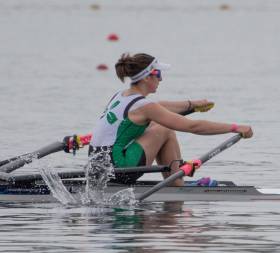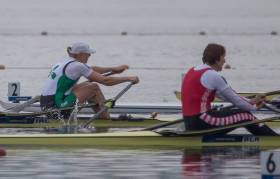Displaying items by tag: Brandenburg
Walsh Wins Repechage to Take Place in A Final
#Rowing: Ireland has its first finalist of the European Rowing Championships. Denise Walsh pulled off a surprise win in her lightweight single sculls repechage from lane one. The Skibbereen woman started well and led to half way, but by then Imogen Walsh, the defending champion from Britain, had moved up right beside her. The Briton then took over the lead and both moved clear of the field. Denise Walsh to resumed her place in the lead before the finish line. Both Walshs qualified for Sunday’s final.
European Championships, Brandenburg, Germany – Day Two (Selected results, Irish interest)
Women
Lightweight Single Sculls – Repechage (First Two to A Final; rest to B Final): 1 Ireland (D Walsh) 8:39.41, 2 Britain (I Walsh) 8:41.08.
O'Donovans Win Heat at European Championships
#Rowing: Gary and Paul O’Donovan won their heat of the lightweight double sculls at the European Championships in Brandenburg in Germany. The Czech Republic showed well early on, but by halfway the brothers from Skibbereen had a small lead, which they extended from there on. As the Czechs faded, Belgium strengthened, and they took second. Switzerland edged out the Czechs for the third direct qualification place.
Sinéad Jennings and Claire Lambe took second in their heat of the lightweight double to qualify for the semi-finals. With Ukraine stuck in fourth place, the Netherlands, Ireland and Germany were set for the semi-final places, but fought it out before finishing in that order.
Denise Walsh finished fifth in her heat of the lightweight single sculls and must compete in a repechage. In the men’s lightweight pair, the world champions, Sam Scrimgeour and Joel Cassells of Britain, won their heat and took the A Final place. The Ireland crew of Mark O’Donovan and Shane O’Driscoll held second right down the course and sprinted to the line to hold off a challenge by Poland.
European Championships, Brandenburg, Germany – Day One (Selected results, Irish interest)
Men
Lightweight Pair – Heat One (Winner to A Final; rest to repechage): 1 Britain (S Scrimgeour, J Cassells) 6:59.29; 2 Ireland (M O’Donovan, S O’Driscoll) 7:06.20.
Lightweight Double Sculls – Heat Two (First three to A/B Semi-Finals; rest to repechage): 1 Ireland (G O’Donovan, P O’Donovan) 6:46.75, 2 Belgium 6:49.46, 3 Switzerland 6:51.12.
Women
Quadruple Sculls – Heat One (Winner to A Final; rest to repechage): 3 Britain (3: H Nixon) 6:48.20.
Single Sculls – Heat One (First three to A/B Semi-Finals; rest to repechage): 1 Ireland (S Puspure) 8:09.55, 2 Latvia (E Gulbe) 8:13.73, 3 Britain (M Hodgkins-Byrne) 8:16.21.
Lightweight Double Sculls – Heat Three (First three to A/B Semi-Finals; rest to repechage): 1 Netherlands 7:29.38, 2 Ireland (C Lambe, S Jennings) 7:34.04, 3 Germany 7:38.89.
Lightweight Single Sculls – Heat One (First Two to A Final; rest to repechage): 1 Denmark 8:23.99, 2 Poland 8:25.82: 5 Ireland (D Walsh) 8:35.99.
Puspure in Command in European Heat
#Rowing: Sanita Puspure won her heat of the single sculls at the European Rowing Championships in Brandenburg, Germany, this morning. The Ireland competitor disputed the lead with Mathilde Hodgkins-Byrne of Britain in the early stages of the race, but took over on her own by half way and beat second-placed Elza Gulbe of Latvia by over four seconds. Gulbe and Hodgkins-Byrne also qualified directly for the semi-finals. Mirka Knapkova and Ekaterina Karsten were the top two in the second heat and Magdalena Lobnig won the third.
European Championships, Brandenburg, Germany – Day One (Selected results, Irish interest)
Women
Single Sculls – Heat One (First three to A/B Semi-Finals; rest to repechage): 1 Ireland (S Puspure) 8:09.55, 2 Latvia (E Gulbe) 8:13.73, 3 Britain (M Hodgkins-Byrne) 8:16.21.






























































